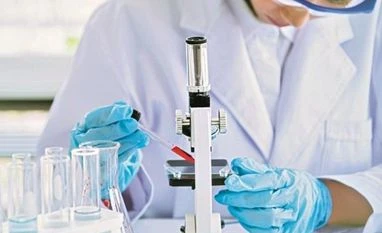Roche has struck a $1.7 billion cancer drug pact with Blueprint Medicines, it said on Tuesday, as advances in genetic testing for rare mutations drive lucrative deals for expensive treatments.
The Swiss drugmaker will pay $675 million in cash and make a $100 million equity investment in Blueprint for rights to pralsetinib, which could gain US approval against so-called RET-altered non-small cell lung cancer in November.
US company Blueprint, which has been working with Roche since 2016, could also receive up to $927 million in milestone payments, plus royalties on sales outside the United States, Roche said in a statement.
Mutations to the RET gene can drive tumour growth, but given that such genetic changes occur in only a fraction of patients with lung or thyroid cancer, genetic testing is key to prescribing the most beneficial drugs.
Roche's diagnostics division is key to a deal that will enable the company to expand on a portfolio of medicines such as Alecensa and Rozlytrek, which require testing to determine which patients will benefit.
"We will leverage our global reach and expertise in oncology, as well as our capabilities in diagnostics," said James Sabry, Roche's head of partnerships.
Beyond lung cancer, Blueprint has also submitted pralsetinib to the US Food and Drug Administration (FDA) for treating advanced RET mutant and RET fusion-positive thyroid cancers.
Roche and Blueprint are not alone in combining sophisticated diagnostics with niche drugs.
Eli Lilly and Co and German drugmaker Bayer's Vitrakvi also targets tumours with a rare mutations identified by testing. Novartis and Incyte, meanwhile, won approval this year for lung cancer drug Tabrecta, which also requires genetic testing.
Both Tabrecta and Vitrakvi rely on a diagnostic test from Roche's Foundation Medicine diagnostics unit.
Though such gene mutations affect relatively few patients, the companies aim to turn their medicines into blockbusters by commanding prices running into the tens of thousands of dollars per month.
Tabrecta costs $18,000 a month, Roche's Rozlytrek is priced similarly and Vitrakvi lists at $32,800 a month.
To read the full story, Subscribe Now at just Rs 249 a month
Already a subscriber? Log in
Subscribe To BS Premium
₹249
Renews automatically
₹1699₹1999
Opt for auto renewal and save Rs. 300 Renews automatically
₹1999
What you get on BS Premium?
-
Unlock 30+ premium stories daily hand-picked by our editors, across devices on browser and app.
-
Pick your 5 favourite companies, get a daily email with all news updates on them.
Full access to our intuitive epaper - clip, save, share articles from any device; newspaper archives from 2006.
Preferential invites to Business Standard events.
Curated newsletters on markets, personal finance, policy & politics, start-ups, technology, and more.
Need More Information - write to us at assist@bsmail.in
)